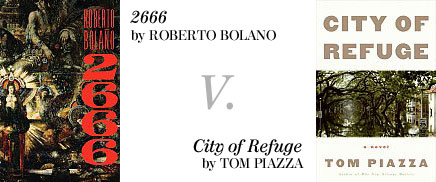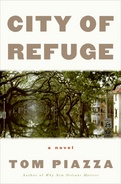
- This is Semifinals Round, Match 1
- March 25, 2009
- Next Match
- Previous Match
The Tournament of Books is an annual battle royale between 16 of the best novels published in the previous year.
A new match is played here each weekday in March.
All titles 30% off at Powells.com
The Rooster on Facebook, and on Twitter
Previous years: 2008, 2007, 2006, 2005
Contact the Tournament staff:
talk@themorningnews.org

judged by Liz Entman
When you have a book as big as 2666 and a writer as skilled as Bolaño, you’re bound to find something to like, and I did. I enjoyed some of the characters, occasionally laughed, and thought the translation was great—it read like a book written in English. His versatility is clear from his variety of settings and characters; his imagination is vivid and occasionally transcendent. But I also frequently found myself bored and waiting for some kind of payoff, which usually came in the form of a tiny thread from one of the other stories—the appearance of a crossover character or a passing reference to something prominently featured in another story. Unfortunately, the connections didn’t weave together enough to create a rich enough universe to make me think that I was reading a single book. This reading experience nicely parallels the epidemic of mostly unrelated femicides at the heart of the book, but it also makes for an unsatisfying read.
I wonder if this is not so much a fault of the book as it is a fault of its presentation. Bolaño wrote the book while he was dying, and intended it to be released in five volumes over the course of five years. After his death, his literary executors chose to release it all at once instead. The single-volume approach does make the entire text available to the academic reader all at once, but perhaps imposes a false sense of cohesion that leaves the rest of us grasping for connections that may not really exist. To me, 2666 felt big and baggy and unmanageable—like one of those weird water-filled rubber tube toys designed to slip through your hands no matter how hard you grip.
Piazza’s novel is not without its flaws, either. For one thing, everybody’s got a heart of gold. The characters worry and bicker and have nightmares, but you’d expect at least one person to lash out, strike someone they love, sink into drink or despair, steal from someone trying to help them, cut all their hair off, cheat on their spouse, get a memorial tattoo, commit suicide, disappear without saying goodbye…something, anything to reflect how wounded these souls are. But it doesn’t happen. Everybody comes through the storm stronger and better, and most discover or rediscover love and the importance of family along the way. Even the people who decide not to return to New Orleans don’t abandon it entirely.
The other problem is that it’s not so much a work of historical fiction as it is a fiction punctuated by nonfiction: At several points, Piazza abandons his characters to describe the storm and the resulting floods in his own voice—he never uses the word “I,” but his own rage and sadness and love for New Orleans seethe visibly beneath his words. Fortunately, he never tips over the edge into screed or sentimentality or propaganda, and that’s what saves him here. Even though these nonfiction passages feel misplaced, the reading is still good.
In fact, the reading is good throughout. His storytelling is impeccable in both the rhythm of the words and the pacing of ideas, his characters’ voices are pitch-perfect, and his sentences are clear and bright and often achingly beautiful. (The copyediting was a little slack, but it’s easy to forget the red pencil in your hand when a book is this engaging.) If I’d started City of Refuge on a weekend, I’d have read it in a single sitting.
I couldn’t have done that with 2666 even if I’d wanted to. And I didn’t want to—it was occasionally interesting and funny, but rarely compelling and often a chore I resisted. In contrast, I resisted reading City of Refuge on my lunch break at work not because I didn’t enjoy it, but because I didn’t know if I’d be able to compose myself when it was time to go back to my desk.
City of Refuge advances to the Zombie round.
Today’s WINNER
City of Refuge by Tom Piazza

About the Judge
From the Booth
| 2666 is like a drunk, rambling, arrogant asshole that keeps pawing your girlfriend and provoking you at the bar. | Kevin | John | City of Refuge tends to make you remember its virtues, rather than its shortcomings. |
» Read Kevin Guilfoile & John Warner’s commentary on the match and leave a comment of your own «
The Standings
View the Brackets [PDF]
• Finals •
City of Refuge3 v. A Mercy1
judged by all judges + Amanda Hesser
• Round 1 •
26661 v. Steer Toward Rock4
judged by Brockman
Netherland2 v. A Partisan’s Daughter3
judged by Kate Schlegel
The White Tiger1 v. Harry, Revised4
judged by Jonah Lehrer
Unaccustomed Earth2 v. City of Refuge3
judged by Mary Roach
Shadow Country1 v. The Disreputable History of Frankie Landau-Banks4
judged by Anthony Doerr
The Lazarus Project2 v. The Northern Clemency3
judged by Monica Ali
A Mercy1 v. The Dart League King4
judged by Jonathan Eig
Home2 v. My Revolutions3
judged by Witold Riedel
• Round 2 •
26661 v. A Partisan’s Daughter3
judged by Maud Newton
Harry, Revised4 v. City of Refuge3
judged by David Rees
Shadow Country1 v. The Lazarus Project2
judged by C. Max Magee
A Mercy1 v. My Revolutions3
judged by John Hodgman
• Semifinals •
26661 v. City of Refuge3
judged by Liz Entman
Shadow Country1 v. A Mercy1
judged by Junot Díaz
• Zombie Round •
City of Refuge3 v. The Disreputable History of Frankie Landau-Banks4
judged by Rosecrans Baldwin

